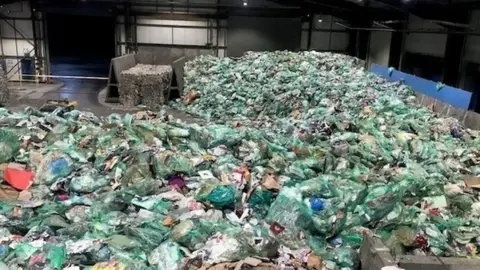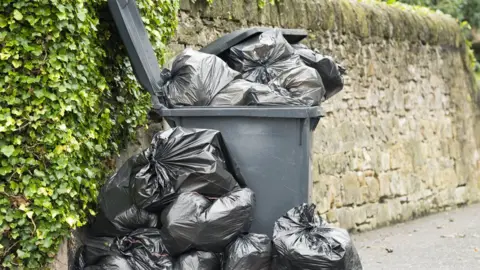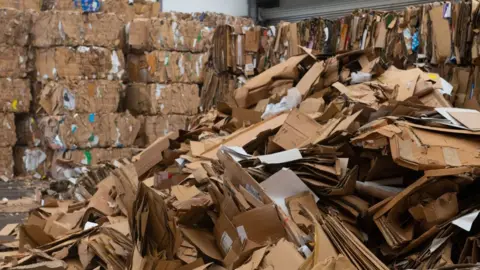Covid: Lockdown online shopping sees recycling increase in Wales
 Cardiff council
Cardiff councilA surge in people shopping online and getting home deliveries during lockdown has led to an increase in recycling across Wales, figures have shown.
Over the past seven weeks, people have been told to "stay home" as Wales has been in a strict lockdown.
Councils said it led to people recycling more, with 500 extra tonnes of recycling put out over Christmas in Rhondda Cynon Taf alone.
The Welsh Government said the recycling improvements were "heartening".
While all councils normally see an increase in waste over Christmas, this rose "substantially" over the latest festive period as people celebrated at home and had presents delivered.
Councils said it was likely due to more people working from home, schools and pubs shut, and increased packaging from online shopping.
Many authorities said it had been challenging to collect the growing number of bags while dealing with staff sickness due to Covid, as well as disruption due to snow, ice and flooding.
Some collections, including garden waste, remain suspended.
In Cardiff, the council dealt with an estimated 400 extra tonnes of recycling over Christmas - a 25% annual increase - while Bridgend saw an increase of 410 tonnes.
In Rhondda Cynon Taf, one of the areas hit the hardest by the pandemic, staff collected more than 2,770 tonnes of recycling over the two-week festive period - or 692 full bin lorries - an increase of 500 tonnes (18%) on 2019.
The council praised residents after its "greenest Christmas ever", with 450 tonnes collected in just one day, and some residents putting out more than 50 bags.
Despite high numbers of Covid cases in the community, the council said it had "limited issues with staff shortages".
 Getty Images
Getty ImagesDrop in recycling after lockdown hits
Councils in Wales are expected to reach a 70% recycling target by 2024 or face fines of £200 per tonne, with the aim to send no waste to landfill by 2050.
In 2019-20, more waste was recycled in Wales than ever before - 65.1% - but this was before the start of the first UK-wide lockdown.
However, provisional figures from Stats Wales suggest that less recycling was collected during the first few months of the pandemic as many businesses closed and people worked from home.
In 2019-20, almost 300,000 tonnes of waste - about 4% of all municipal waste - was collected from commercial and industrial premises, including 137,488 tonnes of recycling.
The amount of waste reused, recycled or composted dropped from 66.8% in April-June 2019 to 64% in the same months in 2020.
However, this comes on the back of all waste falling, from 400,000 tonnes to 339,600, with shops, pubs and cafes not generating rubbish, meaning a significant amount less was sent to landfill - 17,325 tonnes compared to 34,667 tonnes in the same three months in 2019.
'Staff sickness and overflowing bins'
Councils say they have been hit with rising amounts of rubbish and increased staff sickness due to Covid-19 or people self-isolating.
During the first lockdown from March 2020, household recycling in Cardiff was temporarily sent to an incinerator to be burnt rather than being sorted and recycled, due to staffing issues.
Many councils said they drafted in extra workers and put on extra lorries in a bid to cope.
In Vale of Glamorgan, the amount of rubbish being thrown out increased by about 30%, with bin workers making numerous visits to "catch up".
Cardiff council, which missed the Welsh Government target for 2019-20, said it experienced "substantial staff shortages" and hitting the 2020-21 target would be "extremely challenging".
The authority struggled to deal with rising recycling demand over Christmas, with an extra 400 tonnes on the streets - on a normal day it would collect 50 tonnes.
"Alongside this extra waste, the council has also experienced a 17% reduction in staff in the department due to workers either testing positive for Covid or having to shield, or self-isolate," the council said.
'Snow, ice and floods'
Stretched council services were faced with another challenge recently - the weather.
Storm Christoph, which left villages underwater, saw collections disrupted in parts of Wales, while snow and icy conditions left crews unable to access some streets.
Steve Jones, chief officer for Street Scene and transportation for Flintshire council, said the pandemic, combined with bad weather, was "unprecedented" after the authority was criticised for not collecting plastic and cardboard recycling between Christmas and New Year.
Some criticism led to rows breaking out on social media between council workers and residents, and Mr Jones admitted some staff "overstepped the mark", after seeing the criticism when they were working so hard.
Some councils also said fly-tipping had risen and litter bins were overflowing due to people dumping their household rubbish in them.
The Welsh Government has started a consultation on making Wales "litter free" after a rise in plastic bottles, face masks and fly-tipping in beauty spots.
It includes proposals to get businesses to cut down on packaging, potentially increasing fines for littering, and making it illegal to throw litter from cars.
Problem parkers and abusive phone calls
With more people working from home, some councils, including Pembrokeshire, said bin lorries struggled to get down some streets, with large numbers of cars obstructing pavements.
In Merthyr, where crews have started earlier in the morning and more vehicles have been used, some call centre staff had suffered abusive calls, but the council said this was no higher than when collections were missed in bad weather.
 Getty Images
Getty ImagesSome councils have already announced plans to slash services as they try to meet budget demands in the face of the pandemic, putting workers' jobs at risk.
In Powys, black bin collections could be cut to just once a month, following in the footsteps of Conwy, as part of plans to save £164,000 next year, and to encourage recycling.
The Welsh Government said councils were working to ensure rubbish was "re-used, re-manufactured and recycled rather than ending up in landfill, which is particularly challenging given the increased rates of collection seen at individual authorities following the Christmas period".
